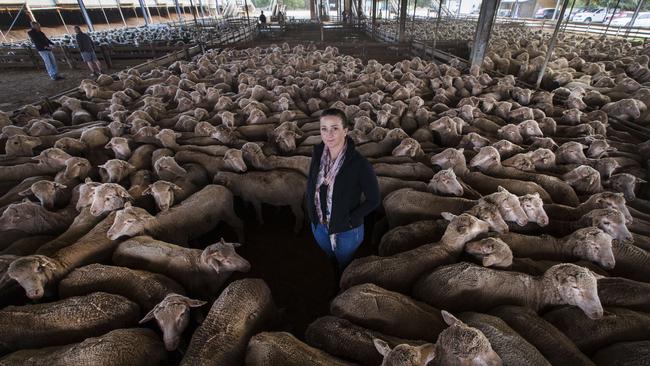In for the long haul to save live sheep exports
Holly Ludeman is facing a hostile public and the possible end of live sheep export if Labor wins on May 18.

Swirling mobs of sheep in a Kuwaiti-owned feedlot south of Perth surround veterinarian Holly Ludeman, the woman determined to safeguard the live export industry for West Australian farmers who provide three-quarters of Australia’s live sheep to the Middle East.
But Dr Ludeman, who set up a pro-trade campaign called The Sheep Collective to offer “industry transparency” and try to win over its critics, faces a hostile public and the possible end of live sheep export if Labor wins on May 18.
The company for which she works, Emanuel Exports, was responsible for 2700 sheep deaths from heat stress on its contracted livestock ship, the Awassi Express, in 2017. Emanuel has since had its export licence cancelled, so the 56,000 sheep it has procured at the sprawling Mundijong feedlot will be exported by another licensed exporter next week.
It will be the last shipment before the start of a three-month moratorium on sending ships into the height of the Middle Eastern summer. Dr Ludeman says the “reactionary” political promise by Labor to phase out the trade over five years is no longer warranted, due to increased scrutiny aboard ships and the fact that death rates of less than 1 per cent were recorded on the past eight livestock ships from Fremantle.
“Sometimes in a crisis situation like (the Awassi), it gives a chance for people to step up and show some leadership,” says 37-year-old Dr Ludeman, Emanuel’s compliance officer who was hired to deal with the crisis.
“I think that’s what the industry has finally done.”
The Sheep Collective campaign has gained fans among farmers, livestock agents and truck-fleet owners with a stake in the industry.
Backing the Sheep Collective are Liberal-National candidates in Western Australia’s three rural seats, including the vast electorate of O’Connor from where most of the state’s 1.5 million exported sheep are sourced. And farm lobby group WAFarmers says sheep prices could fall by up to 35 per cent — and $200 million disappear from the state economy — if a trade ban was forced on Western Australia’s $550m sheep industry.
Even the state Labor government is reluctant to support an export ban, although it favours opening more abattoirs.
But like the live sheep trade itself, the company at the centre of the crisis faces formidable hurdles. A brief of evidence against Emanuel Exports has been handed to the Commonwealth Director of Public Prosecutions while the WA government — which raided Emanuel’s Perth office last year — is still investigating the company over possible breaches of animal welfare laws in the Awassi case.
The office of state Agriculture Minister Alannah MacTiernan said it was “co-operating with the commonwealth regarding state legal action, with appropriate consideration given to the related commonwealth investigation”.
No charges have been laid against the company.




To join the conversation, please log in. Don't have an account? Register
Join the conversation, you are commenting as Logout